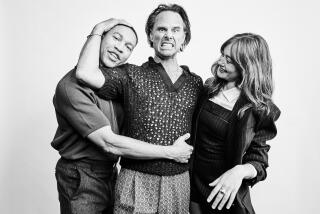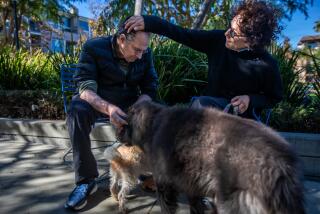A new round of ruminating for a changing ‘Deadwood’
- Share via
“Deadwood,” David Milch’s richly layered take on an outpost of the Old West, begins its second season on HBO tonight with the arrival in camp of the telegraph pole, new prostitutes for an upscale whorehouse, and, most ominously, word that the Black Hills of South Dakota, in which the camp of Deadwood is contained, are to be divided up into three counties, each with a county commissioner.
Deadwood, in other words, lawless and isolated, a kind of war zone of the spirit, is being threatened with gentrification, and with this gentrification will come obsolescence.
“Messages from invisible sources, or what some people think of as progress,” Al Swearengen, the vice and influence peddler who owns the Gem Saloon, says as he stands on his balcony, gazing at the telegraph poles going up on the edge of the camp. Swearengen, who is played with ravenous energy by Ian McShane, tends to do his best ruminating while receiving services from one of his prostitutes, but in this case he’s just guzzling booze, idling away the morning with two of his lieutenants.
“Ain’t the heathens used smoke signals all through recorded history?” says one of them, Dan Dority (W. Earl Brown).
“How’s that a ... recommendation?” Swearengen snaps. “Ain’t the state of things cloudy enough? Don’t we face enough ... imponderables?”
When “Deadwood” arrived on HBO last year, it was regarded by many as a weird, sometimes impenetrable western, featuring historical characters you’d heard of (Wild Bill Hickok, Calamity Jane) and others you hadn’t (Swearengen and his nemesis, the Montana marshal turned hardware store owner Seth Bullock).
Milch, who previously poured his creative energies into the flawed cop characters of “Hill Street Blues” and “NYPD Blue,” now went back in time to create a world of equally broken men and women, most of whom are alcoholics and speak in a dialect that marries the grandiose with the profane.
It looked like a period piece, all right, but talked like something else, something darker and more obtuse than your classic western, in which the villains and the heroes are easy enough to identify and disputes are resolved with gunplay and many fewer words. There is something unusual or even perverse about a western in which the characters argue against the promise of wide-open spaces and generally don’t ride horses. Milch isn’t just working against a TV tradition here (networks long ago banished westerns to the occasional original movie or miniseries, all of which seemed to star Sam Elliott), he’s working against most movies too, from “The Man Who Shot Liberty Valance” to “Unforgiven.” Those classics are steeped in myth, in men of few words doing deeds good and bad.
But the deeds speak for themselves.
So too on “Deadwood,” although the ratio of soliloquies to gunfights is easily 10 to 1, and meanwhile you can’t always understand what the characters are saying, much less understand exactly what they’re up to, which contributes to an overall sense of tension and alienation.
And yet it’s all kind of pleasingly thematic, alternately gritty and funny and caked with moral decay. Milch loves the wordplay; the show’s language is one of its constant sources of pleasure. Not everyone’s drunk in “Deadwood,” but the liquor flows freely, lubricating the mood; the way the show is lighted, it always seems like late afternoon, and the set is a dingy, muddy Main Street with little side neighborhoods that function as slums.
Milch’s research into the era led him to the real historical place of Deadwood, land stolen from the Indians and converted into a Gold Rush town that existed, for a spell, outside law; for Milch, this became a paradigm in which to explore a bigger sociological theme, in which the camp is a “single organism,” as he calls it, with distinct, rival interests clashing but also needing each other to survive.
In “Deadwood’s” first 12 episodes, Wild Bill Hickok (Keith Carradine) was killed by a drifter in a poker game, the camp was hit by a smallpox outbreak, a preacher died, and Bullock (Timothy Olyphant), who opened a hardware store in town with his friend, Sol Starr (John Hawkes), began an affair with Alma Garret (Molly Parker), the widow of a murdered gold prospector.
Bullock also became the camp’s sheriff, deepening his uneasy alliance with Swearengen. Starr, meanwhile, hooked up with Trixie (Paula Malcomson), the prostitute Swearengen alternately abuses and loves.
On the periphery of these little dramas swim a host of colorful characters, including the simpering hotelier E.B. Farnum (William Sanderson); Cy Tolliver, the cold-blooded proprietor of the Bella Union saloon (Powers Boothe); the town’s newspaperman, A.W. Merrick (Jeffrey Jones); the camp doctor, Doc Cochran (Brad Dourif); Bullock’s deputy, Charlie Utter (Dayton Callie); and the hard-drinking Calamity Jane (Robin Weigert).
Among them there is not a prevailing conscience, really; there’s Bullock, strutting about the camp with his hard-bitten sense of justice, and Swearengen, meting out his favors and punishments, but they’re all more a ragtag bunch of survivalists.
Having established what makes his quasi-historical world tick in season one, Milch and his writers, at least judging by the first four episodes of the new season, will now explore how the camp’s inner world adjusts to the arrival of outside forces greater than any in the camp.
The show this season builds to moments of tender mercies -- to the idea of community. There is the arrival of Bullock’s wife and child, his brother’s widow and son; meanwhile, gold claims are thrown into question. In tonight’s episode, Bullock and Swearengen square off in a violent brawl that leaves Swearengen the worse for wear. He’s also passing kidney stones, which will require the attention of Doc Cochran and a particularly blunt instrument. “I’m gonna pass this through your penis up into your bladder, Al, and I’m gonna say this once: I’m sorry for how it hurts,” Cochran tells him.
That arc, brutal at first to watch, ends on a surprising and poignant note. A historically based character, Swearengen, as played by McShane, is really the show’s temperature gauge. “That Bullock’s a strategist, ain’t he?” he says to the prostitute he’s busy with at the conclusion of an episode. After the brawl, he’s left with only one good eye to peer out at the world, and that eye is open wide to the next “imponderable.” On “Deadwood,” that can involve anything, up to and including restoring a human being’s capacity to urinate.
More to Read
The complete guide to home viewing
Get Screen Gab for everything about the TV shows and streaming movies everyone’s talking about.
You may occasionally receive promotional content from the Los Angeles Times.






